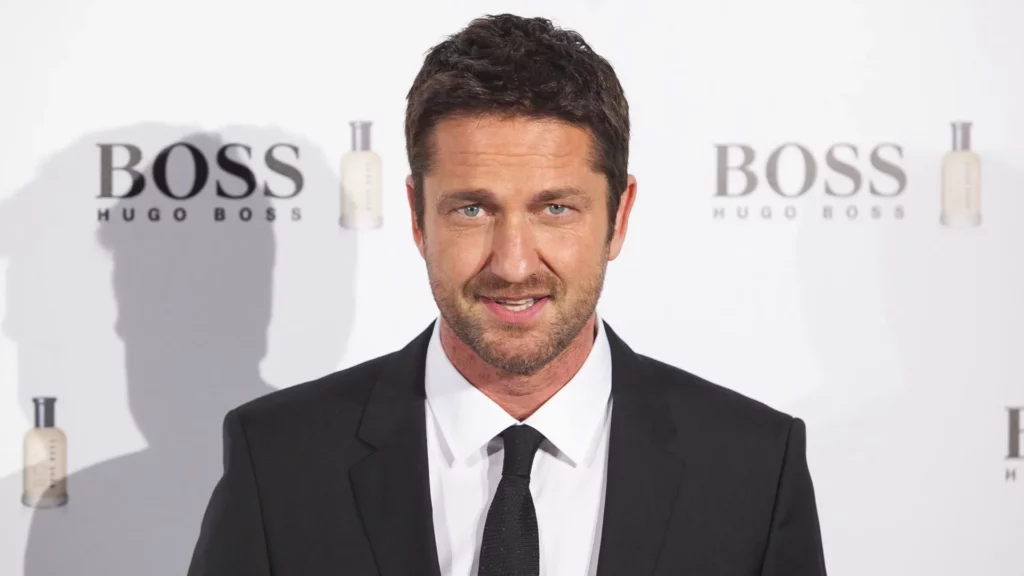Gerard Butler Biography: Gerard James Butler is a Paisley, Scotland-born Scottish actor, producer, singer, and musician. Butler is most known for his roles in the films “Tomorrow Never Dies,” “Tale of the Mummy,” “Dracula 2000,” “300,” and “Hunter Killer.”
Gerard Butler Biography
Gerard Butler Biography: Gerard James Butler was born in Paisley, Renfrewshire, Scotland, on November 13, 1969. Gerard was raised in a Catholic household with two siblings before moving to Montreal, Quebec, Canada, with his family when he was six months old. However, Butler only had a little time in Canada before his parents divorced, and his mother returned to Scotland when he was just 18 months old.
Butler got admitted to the University of Glasgow School of Law after excelling in high school. During this time, he became engaged in theater, and, as a 16-year-old, he compared himself with his father for the first time. Gerard became president of the school’s legal society and joined a rock band during his undergraduate years. His father died of cancer when he was just 22 years old. This entirely shook Gerard.
Butler took a year off from university before finishing his last year of law school, possibly due to his father’s death. He moved to California, lived on Venice Beach, worked odd jobs, and drank frequently. Everything came to a head when he got arrested for disorderly conduct after being extremely intoxicated. Even though he was “out of control,” Butler returned to Scotland after a year to finish law school.

Gerard Butler Wiki
| Name | Gerard Butler |
| Date Of Birth | November 13, 1969 |
| Birth Place | Paisley, Renfrewshire, Scotland |
| Height | 1.88 m |
| Weight | 85Kg |
| Zodiac Sign | Scorpio |
| Net Worth | $80 million |
Also Read: Cara Delevingne Biography, Wiki, Net Worth, Dating, Sexuality, Career
Gerard Butler’s Net Worth
Gerard Butler is a wealthy Scottish actor with an estimated net worth of $80 million.

Gerard Butler Career
Even though Butler had the potential for a successful professional career, his options appeared limited after he was dismissed for excessive drinking and missing work due to late-night celebrations. At the time, he was still a law student, which meant he still needed to be qualified to practice law professionally.
Instead of resuming his legal career, Butler moved to London to achieve fame. No, he didn’t necessarily want to be a successful actor; according to subsequent interviews, his primary objective was to gain fame by any means possible. His acting career halted early on, like his efforts to become a lawyer. However, this time would be different for Butler. He reconnected with an old friend from his Scottish Youth Theatre days, who was now a casting director. This gave him the necessary connections to secure his first stage role in Shakespeare’s “Coriolanus.”
“Trainspotting” was modified for the stage, which led to additional theater employment. He was then cast in films such as “Mrs. Brown,” “Tomorrow Never Dies,” and “Tale of the Mummy.” Butler decided around this time to transfer to Los Angeles. Once he arrived in the United States, he got roles in some additional projects, but his breakthrough roles were in “Attila” and “Dracula 2000.”
When he was cast in “Reign of Fire” in 2002, Butler experienced another significant occasion. Gerard co-starred with Matthew McConaughey, and despite the film’s critical and commercial failure, it helped place Gerard on the map. Later, “Reign of Fire” became a cult classic in certain circles.
In the years that followed, Butler got roles in films such as “Lara Croft: Tomb Raider – The Cradle of Life,” “Timeline,” and “Phantom of the Opera.” After starring in films such as “Dear Frankie,” “The Game of Their Lives,” and “Beowulf & Grendel,” Butler made a significant move forward by gaining the lead role in “300.” Shortly after that, Gerard portrayed Stoick in the animated film “How to Train Your Dragon.” Butler assumed the role of Mike Banning in the 2013 thriller “Olympus Has Fallen.” He reprised his previous role in spin-offs like “London Has Fallen” and “Angel Has Fallen.” In addition to “300,” these films became some of his most well-known wor





















